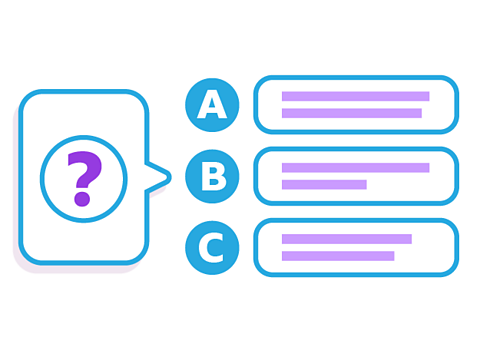Key points about prepositions of place and time in Spanish

Prepositions connect the people, objects, time and locations of a sentence.
In Spanish prepositions come directly before a nounThe name of a thing such as an object, a place or a person. Nouns are often described as naming words..
Prepositions in English include: under, over, on, in, inside, between, before, after.
What are prepositions?
Prepositions are words used to link nouns, pronouns, or phrases to other words within a sentence. They connect the people, objects, time and locations of a sentence.
Prepositions are usually short words and they are normally placed directly in front of nouns.
Prepositions of place in Spanish
Here are some common prepositions of place in Spanish:
| Spanish | English | Spanish | English |
|---|---|---|---|
| Sorry, something went wrongCheck your connection, refresh the page and try again. | at/to | Sorry, something went wrongCheck your connection, refresh the page and try again. | opposite |
| Sorry, something went wrongCheck your connection, refresh the page and try again. | next to | Sorry, something went wrongCheck your connection, refresh the page and try again. | inside |
| Sorry, something went wrongCheck your connection, refresh the page and try again. | behind | Sorry, something went wrongCheck your connection, refresh the page and try again. | at the back of |
| Sorry, something went wrongCheck your connection, refresh the page and try again. | in front of | Sorry, something went wrongCheck your connection, refresh the page and try again. | towards |
| Sorry, something went wrongCheck your connection, refresh the page and try again. | between | Sorry, something went wrongCheck your connection, refresh the page and try again. | against |
| Sorry, something went wrongCheck your connection, refresh the page and try again./ Sorry, something went wrongCheck your connection, refresh the page and try again. | below/under | Sorry, something went wrongCheck your connection, refresh the page and try again. | to the right of |
| Sorry, something went wrongCheck your connection, refresh the page and try again. | on | Sorry, something went wrongCheck your connection, refresh the page and try again. | to the left of |
| Sorry, something went wrongCheck your connection, refresh the page and try again. | upon | Sorry, something went wrongCheck your connection, refresh the page and try again. | behind |
| Sorry, something went wrongCheck your connection, refresh the page and try again. | above/on top of | Sorry, something went wrongCheck your connection, refresh the page and try again. | through |
For example:
Mi casa estĆ” al lado de la piscina. - My house is next to the swimming pool.
Contraction of 'de' and 'el' to form 'del'
Several prepositions are followed by de and then the definite article (el/la/los/las) and the noun.
If the preposition followed by de is then followed by a masculine singular noun, the deand the el contract to become Sorry, something went wrongCheck your connection, refresh the page and try again..
For example:
El campo de fĆŗtbol estĆ” detrĆ”s del colegio. - The football pitch is behind the school.
El banco estĆ” enfrente del supermercado. - The bank is opposite the supermarket.
Contraction of 'a' and 'el' to form 'al'
The preposition a contracts with el before a masculine singular noun to become Sorry, something went wrongCheck your connection, refresh the page and try again..
For example:
Estoy al banco. - I am at the bank.
The difference between 'en' (in) and 'dentro de' (inside)
En means 'in' and dentro de means 'inside'.
For example:
en Leeds - in Leeds
dentro de la caja - inside the box
The verb entrar (to go in) is normally followed by en.
For example:
Entro en la tienda. - I go in to the shop.
The difference between 'sobre' (on top of) and 'en' (on)
Use sobre to mean āon top ofā or en to mean 'on'.
For example:
EstĆ” sobre la mesa. - Itās on (top of) the table.
Lo vi en la tele. - I saw it on the TV.
Prepositions of time
Preposition of time in Spanish relate to when something happens.
Here are some common prepositions of time:
| Spanish | English |
|---|---|
| Sorry, something went wrongCheck your connection, refresh the page and try again. | to/at |
| Sorry, something went wrongCheck your connection, refresh the page and try again. | from |
| Sorry, something went wrongCheck your connection, refresh the page and try again. | from/since |
| Sorry, something went wrongCheck your connection, refresh the page and try again. | ago |
| Sorry, something went wrongCheck your connection, refresh the page and try again. | from |
| Sorry, something went wrongCheck your connection, refresh the page and try again. | up to/as far as/until |
| Sorry, something went wrongCheck your connection, refresh the page and try again. | during |
For example:
Como a la una. - I eat at one oāclock.
La clase dura desde las nueve hasta las diez. - The class lasts from nine until ten.
Tengo clases durante la maƱana. - I have classes during the morning.
A partir de septiembre irƩ al instituto. - From September I will go to college.
Prepositions of time - 'desde' and 'hace'
Desde means since in sentences such as:
Me gusta el chocolate desde niƱa. - Iāve loved chocolate since I was a little girl.
No he viajado desde 2019. - I havenāt travelled since 2019.
Hace means ago and is used to talk about actions that happened in the past.
For example:
Fui a EspaƱa hace dos aƱos. - I went to Spain two years ago.
Viajamos a Francia hace tres meses. - We travelled to France three months ago.
Quiz - Prepositions of place and time in Spanish
Higher Tier - Prepositions of time - 'desde hace'
Desde hace is used with the present tense to say how long you have been doing something or how long something has been happening.
For example:
Estudio inglƩs desde hace dos aƱos. - I've been studying English for two years.
Llueve desde hace tres horas. - It's been raining for three hours.
When used in a question, desde hace often comes at the start:
ĀæDesde hace cuĆ”nto tiempo vives en EspaƱa? - How long have you been living in Spain?
Higher Tier - 'Desde' and 'hace' - Mini quiz

Translate the following question into English:
ĀæDesde hace cuĆ”nto tiempo vives en EspaƱa?
How long have you been living in Spain?
Desde hace is used with the present tense to say how long you have been doing something or how long something has been happening.
Now you have learned about prepositions of time and place in Spanish, why not explore talking about the time in Spanish?
More on Prepositions
Find out more by working through a topic
- count2 of 4

- count3 of 4

- count4 of 4
